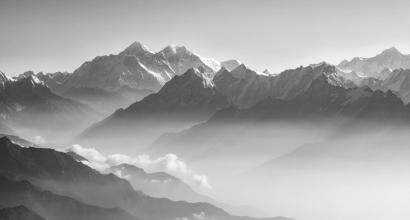The summary is this. Daiva is hidden, a secret. It comes suddenly and unexpectedly, and cannot be grasped by the logic of causality. The word in Saṃskṛta is “ākasmika” — kasmāt means from where — “akasmāt” means that one doesn’t know from where it came. It is not possible to determine the causes and effects of such an occurrence. Since daiva is not directly perceptible, we forget it. The blow of despondency, if it hits us, becomes tolerable if we keep daiva in our minds while performing karma. The sorrow of efforts gone futile becomes hard to bear if daiva is forgotten while performing a karma.
śarīra-vāṅ-manobhir-yat karma prārabhate naraḥ ।
nyāyyaṃ vā viparītaṃ vā pañcaite tasya hetavaḥ ॥BG 18.15
“Whether the work started by a man is that of the body or that of the mind — whether it just or otherwise — the reason for its success or failure has to be looked for in the above five organs”.
Adhiṣṭhāna : Circumstance — we probably have made a mistake in gauging the pressure or the lack thereof, of a situation. Then the effort will go in vain.
Kartṛ : His enthusiasm and belief might wane. Arjuna is a great example.
Karaṇa : Friends and helpers might change. Duryodhana had believed in Śalya. Śalya forsook him when he became the charioteer for Karṇa. Karṇa had a divine weapon, but it did not come to him at the right time.
Upāya-ceṣṭā : In Macbeth’s story, the footsoldiers of the army cut trees down and hid themselves while walking to the enemy castle. The enemies mistook the forest to be moving and ran away. In the history of Mysore, there is a story of a king who tied torches to the horns of oxen. The enemies mistook them for light-ghosts and ran away, scared. These are pṛthak-ceṣṭāh.
The above four belong to human power. Even if all of them are okay, everything will be futile if daiva does not cooperate.
sarvaṃ niṣphalitaṃ tadeva vidhinā daive bale durbale ॥
Why does daiva become adverse? The past karmas of all individuals who are engaged in the present karma might individually or collectively be adverse. Therefore, karma is perhaps not for one person alone. It follows that even the results of karma are not for an individual alone.
In a great karma, the fates of a thousand people might come together. In our tradition, it is customary for people who perform propitious karmas like going on pilgrimages or building temples to first collect alms from a few houses. Why is this? Among the people who give alms, there might be at least a few with puṇya in their account; the idea is that the work may finish without encountering any obstacles. There may be one kartā, and a thousand helpers and approvers. Even they have a share in the results of the karma. Thus, daiva is the result of collective karma.
kartā kārayitā caiva preraka-śca-anumodakaḥ ।
sukṛte duṣkṛte caiva catvāraḥ sama-bhāginaḥ ॥(subhāṣita)
To protect the order and dharma of the universe, daiva might modify the results of the individual karmas — whether they are good or bad. Let us set daiva aside for a moment; it is not available for our examination and inquiry. Let us see the four parties that are in control of man. For a karma to be successful, all four of them should be favourable.
- Adhiṣṭhāna or the circumstance might be favorable in the beginning, but may become adverse later.
- The kartā himself may experience change of thought, or his energy might wane
- His karaṇas — or the ingredients/instruments may be spoiled
- Even if the above three are alright, there may be a mistake in his method.
Thus, the kartṛ is not the only reason for an effort to succeed or fail or yield adverse results. The other three companions of his — or one or two of the above parties may be the reason. Even if daiva is helpful, an effort may go in vain because of human errors.
tatraivaṃ sati kartāram ātmānaṃ kevalaṃ tu yaḥ ।
paśyaty-akṛta-buddhitvāt na sa paśyati durmatiḥ ॥BG 18.16
“When the actual responsibility thus rests with so many people, one who thinks that he alone — the jīvātmā in him alone — is the kartṛ, is devoid of intellect. Such a fool cannot know the truth”.
Here there are two concepts :
- The kartā is not alone. There are other claimants along with him.
- “I” is also an aspect of a jīva and not just ātmā.
The ātmā that is present within a jīva is the same ātmā that is present in all jīvas. The energy of the ātmā is whole, never-changing and indivisible. One who has understood the omnipresence of the ātmā realises that the relationship between the kartā and karma is unimportant and only circumstantial, and therefore it is transcendental and impermanent.
Indeed, didn’t this topic appear in our discussion because of the question of dharma? If Duryodhana were dhārmic and had said “I will give whatever is entitled to you. You please take it and be happy” and acted accordingly, we would have completely missed the story of the Mahabharata. We would not have obtained the BhagavadGītā either. Therefore we have to praise Bhagavān for giving Duryodhana his evilery and scheming mind ! Duryodhana’s evil mind became the pretext in the scheme of daiva.
A jñānin understands that the state of jīva that has been obtained by the ātmā is not permanent and that the doership of the jīvi is not permanent.
yasya nāhaṃkṛto bhāvo buddhir-yasya na lipyate ।
hatvā’pi sa imān lokān na hanti na nibadhyate ॥BG 18.17
“One who is not tainted by ego and does not think of himself as the doer, one whose intellect is not stained with concern for the results of a karma — even if such a man destroys all the worlds, he will not be a killer. It will not shackle him”.
This is the mark of a man who has progressed beyond dharma. We will see this adhidharma — going beyond dharma — later.
It is a crime when one person slays another. The same slaying done by a jñānin is not a crime. This is because other people act out of ego and selfishness. A jñānin does not have them. The objective of a jñānin is for all jīvas to obtain better states. Is it necessary to wipe out whole worlds to move all jīvas to a better state? Bhagavān is not saying that. To illustrate a principle, a figure of speech called utprekṣā is used. Idiomatic language cannot be understood by making sense of mere words. Only the intent should be grasped here.
It is impossible for a person who has understood the true nature of the ātmā to be a sinner. This is because he is not acting out of selfish desires or hatred for others. Even if he does something that is characteristic of an egoistic and mean person, that work will inherently not carry any evilery. Instead, it will be for the welfare and prosperity of the world only. The only desire that such a person carries is the welfare of all beings. Therefore, there is no possibility of pāpa in his dealings.
That is fine. While describing the five components of karma, it is said —
daivaṃ caivātra pañcamam ॥
BG 18.14
Daiva is mentioned here separately. Does not this special component called daiva have authority over the other four? Cannot daiva fix or make favourable the adverse factors, if any, among adhiṣṭhāna, kartā, karaṇa, tantrasādhana — or make them adverse if they are favourable? Is daiva not omnipotent? The answer to that is below :
Daiva cannot rule over all human aspects of karma. A part of human endeavour does depend on divine blessings, but all of it does not. If all aspects of human effort are dependent on daiva, what is left for humans? How can he earn puṇya or pāpa? The responsibility of the doer comes to a naught in that case! A human has puṇya and pāpa. Once we say that he has puṇya and pāpa in his account, it is clear that he will have responsibilities and freedom as well. He has the authority to discern and act accordingly. A man will be concerned with puṇya and pāpa only if human effort is of importance in a karma. Thus, the kartṛ has some amount of freedom when it comes to dos and don’ts. There are authoritative statements in the Brahma-sutras, etc., that declare that man has freedom to examine his progress or decline through his intellect and work towards what he wants.
kartā śāstrārthavattvāt ॥
Brahmasūtra 2-3-33
What does śāstra say? It says that there is puṇya and there is pāpa; it says that there are good and bad results; it says that pleasure and pain are in accordance with dharma or adharma. Therefore, if the instruction about dharma and adharma has to be meaningful, man should have freedom and authority to understand both of them and rationally distinguish between them based on the situation. If that freedom is not given to man, he will not be responsible for dharma or adharma that happens through him.
To be continued...
The present series is a modern English translation of DVG’s Kendra Sahitya Akademi Award-winning work, Bhagavad-gītā-tātparya or Jīvana-dharma-yoga. The translators wish to express their thanks to Śatāvadhāni R Ganesh for his valuable feedback and to Hari Ravikumar for his astute edits.











































